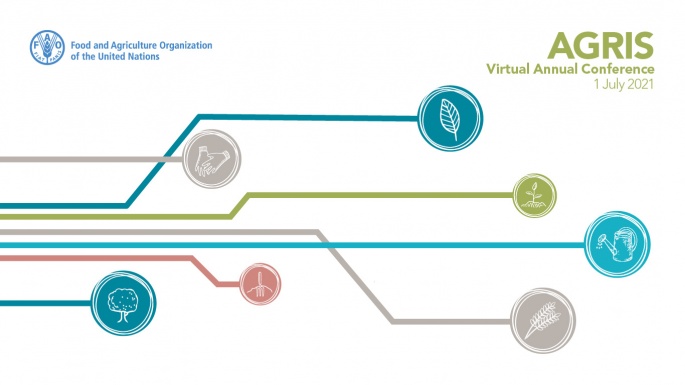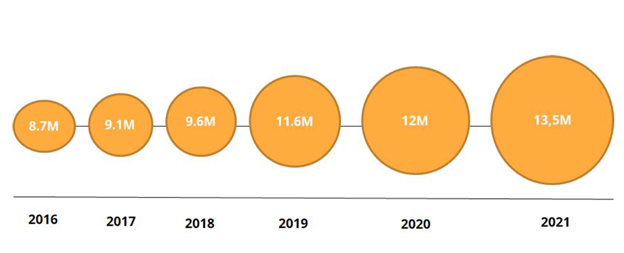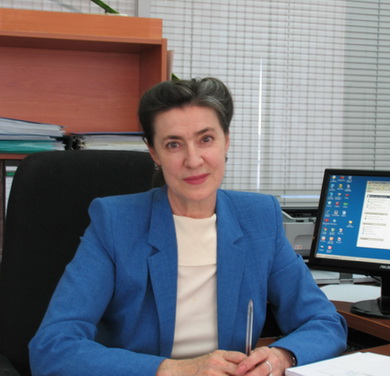To defeat hunger, knowledge is key and sharing it is vital

FAO
Held online on Thursday 1 July, and attended by 563 participants from 124 countries, the AGRIS Virtual Annual Conference 2021 was a tremendous success.
The quality of the presentations, the thoughtful contributions of the six invited panelists, the active and lively engagement of the participating attendees with the topic – which was manifested in the form of interesting questions posed to the presenters, as well as networking in the chat forum – contributed significantly to making the conference a memorable and enlightening one.
Evocatively titled "To defeat hunger, knowledge is key and sharing it is vital,” the conference was interpreted live in all six official FAO languages: Arabic, Chinese, English, French, Russian and Spanish. The number of attendees, as well as the live interpretation, marked this as a first for AGRIS.
This focused, half-day event outlined how FAO-coordinated AGRIS promotes the knowledge sharing essential for agricultural innovation and the sustainable transformation of global agricultural and food systems. Along with reviewing the achievements and challenges of the past year, the meeting explored ways in which organizations can partner with and strengthen AGRIS and benefit themselves.
Six invited panelists from organizations in Italy, Lebanon, Moldova, Nicaragua, the Russian Federation and Uganda underscored the importance of partnerships in knowledge sharing and the benefits that accrue to organizations that partner with AGRIS.
The conference was divided into three main sessions:
- Introduction to AGRIS: How does AGRIS facilitate knowledge sharing to support the fight against hunger? (Imma Subirats, AGRIS Programme Manager and Senior Information Management Officer FAO)
- Partnering with AGRIS: How can your organization benefit from AGRIS? (Ilkay Holt, Information Management Specialist FAO)
- Contributing to AGRIS: How can your organization contribute to AGRIS? (Ilkay Holt and Imma Subirats)
Introduction to AGRIS
The introduction, by Imma Subirats, was structured around what AGRIS is and the ways in which it facilitates the knowledge sharing that is so vital to winning the fight against hunger. After locating AGRIS in the context of FAO and its mission, Imma outlined the history and evolution of AGRIS, along with its general composition, functions, scope and users.

Interesting snapshots of the AGRIS network, comprising 447 data providers (with another 53 pending), usage statistics and content evolution provided the ideal segue into the short speeches of two distinguished panelists: Justin Chisenga and Enrico Bonaiuti.

Justin Chisenga (FAO) explained how AGRIS was a public good that served both developed and developing countries and provided
"...a long term and sustainable solution with a global public domain platform or network through which they you could provide continuous access to your institution's agricultural sciences, technology, data or information, participate in data and knowledge sharing activities."
"My experience in Africa, working on AGRIS and related activities with colleagues in Ministries of Agriculture and related ministries, agriculture research institutes or organizations, and universities has shown me that AGRIS is a huge opportunity as an infrastructure or a network for proving access to agriculture science and technology data and information from developing countries to help generate knowledge, strengthen research capacity and support informed decision-making in the food and agriculture domains in the countries and regions."

Enrico Bonaiuti (ICARDA/CIP), complimented AGRIS:
"As one of the world’s oldest bibliographic databases for agricultural science and technology, the International System for Agricultural Science and Technology (AGRIS) represents a gold-standard in knowledge sharing for agricultural research institutions and organizations worldwide."
Enrico used the example of ICARDA's Monitoring Evaluation and Learning Team (MEL) to emphasize the benefits of partnering with AGRIS:
"A vital function of a platform like AGRIS, maintained globally by FAO, through AGRIS many national research institutions and organizations who don’t operate their own institutional repository can still quickly and easily receive support to manage their research findings and store their metadata. Further, AGRIS is suitable for several types of knowledge such as academic papers, grey literature, datasets and more, offering a high flexibility."
"For MEL, the AGRIS platform was crucial to support content in different languages, enabling us to expand knowledge sharing across countries and audiences and improve visibility and access to agricultural sciences and the technical content of agricultural research."
Partnering with AGRIS
The second session, by Ilkay Holt (FAO), delved into the structure and role of the AGRIS Network – comprising data providers and country hubs – and the ways in which partnering with AGRIS (which receives 10 million views annually) benefited organizations in different ways by:
- Being part of a dynamic international network with a focus on the agricultural content which is accessible, intensively used and massively distributed in the global information landscape;
- Jointly contributing to international science;
- Exchanging information and data between different countries and stakeholders and increase visibility to a broader international audience;
- Sharing unique materials, such as unpublished scientific and technical reports, governmental publications, conference materials, data sets, maps, etc.
- Increasing visibility of the organizations at global level
- Increasing usage of institutional research outputs
- Enabling discoverability on the web
- Offering multilinguality via AGROVOC, the multilingual agricultural thesaurus
- Creating knowledge sharing networks
- Creating opportunities for further collaboration

Viorica Lupu and Ruth Velia Gómez were two panelists who provided the audience with the benefits of their knowledge and experience of partnering with AGRIS:

©C. Plugari
According to Viorica Lupu, AGRIS helps promote Moldovan science globally and
"AGRIS offers the big opportunity to agricultural institutions from the Republic of Moldova to be part of an advantageous and dynamic international network and to contribute to the promotion of Moldovan scientific research globally. Thus, the Republic of Moldova benefits from an open and free service, having the possibility to make its scientific results to be discovered through AGRIS without costs, other barriers and restrictions."
"opens agricultural science and research from the Republic of Moldova to a wider audience and contributes to the easier discovery of publications, to increase the visibility of global research and the citation rate of Moldovan authors."

Ruth Velia Gómez also extolled the benefits of partnering with AGRIS:
"FAO has been a professional leader in global information management. In the last few years, AGRIS has amazingly revolutionized and strengthened its great mission of sharing and managing knowledge for agricultural innovation."
"Working in a network means a lot of commitment and perseverance. AGRIS is a global network that has gone through several stages and with the support of FAO has been able to lead with professionalism the management of information worldwide."
"In recent years, AGRIS has amazingly evolved and strengthened its great mission of sharing and managing knowledge for agricultural innovation... The main challenge is to learn more about AGRIS and to ensure that the knowledge generated in our countries is shared and visible to the world for the development of agricultural research."
Contributing to AGRIS
Jointly presented by Imma Subirats and Ilkay Holt, the third and final session of the conference focused on the different ways organizations could contribute their bibliographic records to AGRIS (email, manual upload and automatic IT protocols); how records were displayed in the database; search the database, as well as new developments that enhanced discoverability of records.
The importance of multilinguality in AGRIS was emphasized and the role of AGROVOC, the multilingual agricultural thesaurus, explained:
- A large number of languages represented in AGRIS (90 languages) is the result of indexing bibliographic records in local languages from all over the world.
- Diversity in terms of representation of languages other than only English in scholarly communication is important and strongly endorsed by AGRIS
- Using AGROVOC, the multilingual thesaurus and controlled vocabulary, in the infrastructure of AGRIS helps the discoverability of the content in a number of languages.
The session was concluded by short and enlightening speeches by panelists Lidia Pirumova and Onan Mulumba.

Lidia Pirumova, Deputy Director for Science at the Central Scientific Agricultural Library (CSAL) in the Russian Federation, noted that AGRIS was a unifying tool for cooperation between national centres and stressed the importance of multilingualism:
"The corporate creation of the AGRIS database by the FAO member countries ensures a complete reflection of national documentary flows on agriculture, which is extremely important for getting an idea of the state of agriculture in the world and in a particular country. The undoubted advantage and benefit of AGRIS are the means of identification and especially thematic retrieval, thanks to the recently renovated AGROVOC thesaurus."
"The AGRIS database is a unifying tool for cooperation between national AGRIS centers, creating the so-called AGRIS community. This is great, because we have become more and more regular to communicate, exchange knowledge, news, technology, just good news."

Onan Mulumba, Head of Agricultural Libraries at Makerere University in Uganda, explained the important role played by AGRIS in the university's information ecosytem and in promoting research collaboration:
"...information resources such as AGORA and AGRIS are among the key electronic sources of information for the university. AGRIS directly supports agricultural research at Makerere by providing free access to its publications."
"Through the AGRIS network, researchers are able to collaborate with other researchers to accomplish certain research tasks, thus enhancing South-to-South, as well as South-to-North research collaborations."
The presentation used in the conference can be accessed HERE.
We would like to thank our guest speakers for sharing their knowledge and insightful thoughts and also the over 500 attendees for their extremely engaged participation (reflected in their comments and questions) in the 2021 AGRIS Annual Conference.
Those who are interested in news and updates from AGRIS can sign up for the newsletter. To find out more about AGRIS, please visit our website.

